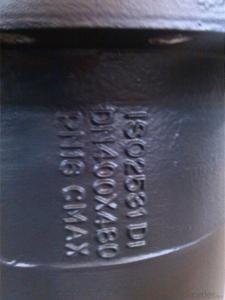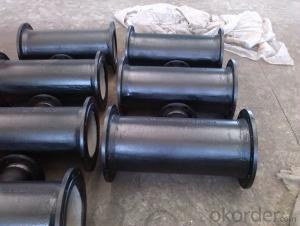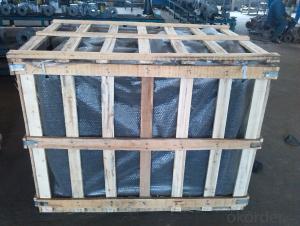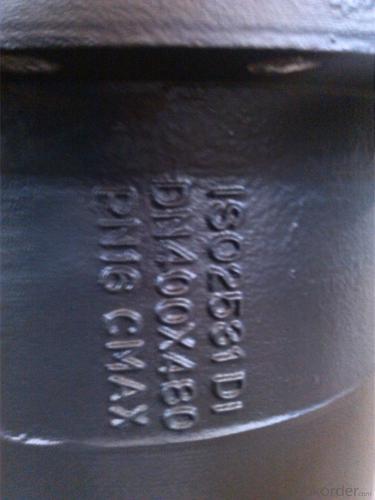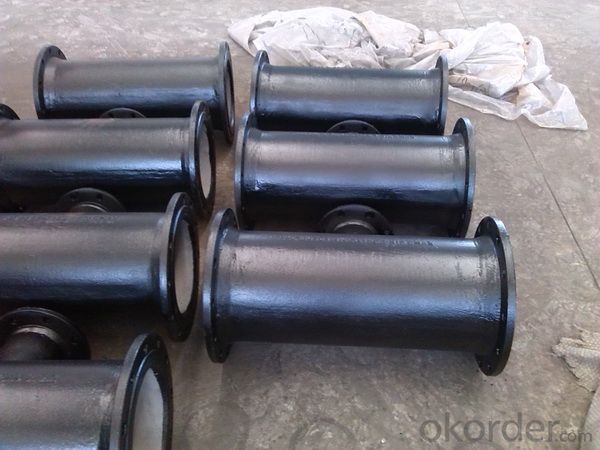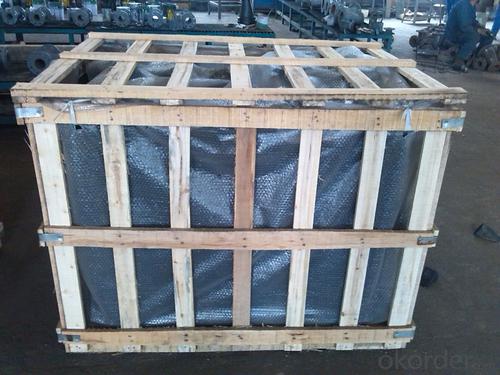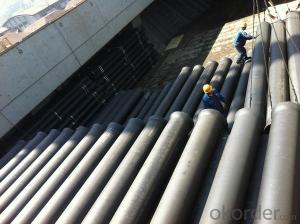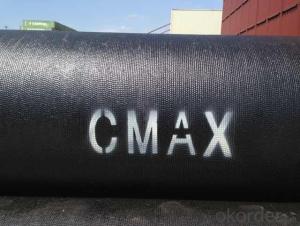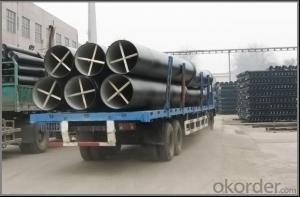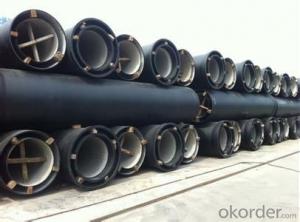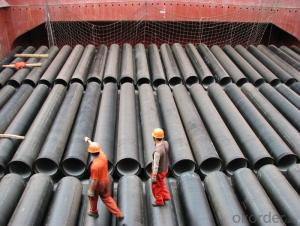DUCTILE IRON PIPE DN125 K7
- Loading Port:
- Tianjin
- Payment Terms:
- TT OR LC
- Min Order Qty:
- -
- Supply Capability:
- 30000Tons m/month
OKorder Service Pledge
OKorder Financial Service
You Might Also Like
CNBM ductile iron pipe ranges from DN80-DN1600mm (T-Type, Class K9), effective length 6m, comply with ISO2531 Standard
Company Profile
CNBM International Corporation is the leading production base and renowned supplier of Ductile Iron Water Pipe systems of both potable and waste water in China. We are constantly looking to develop high quality products to ensure the longest service life and wonderful performance.
CNBM Pipelines regard quality as the essential factor leading to successful business. Every pipe is tested in accordance with BS EN545 (water application) or BS EN598 (sewer application). CNBM Pipelines products comply with and are tested according to the relevant European and International Standards. Our pipes are manufactured under the quality management system BS EN ISO 9001. After years of efforts, CNBM Pipelines has built up great reputation in terms of quality and service among customers worldwide
Product Introduction
CNBM ductile iron pipe ranges from DN80-DN1600mm (Tyton, T-Type, Class K7/K8/K9), effective length: 6m, complying with BS EN545/EN598/ISO2531/BS4772.
Specification& Payment terms
Internal lining: Pipes shall have an internal cement mortar lining in acc with ISO4179.
External coating: Pipes shall be externally coated with metallic zinc spray plus a further layer of resin painting to ISO8179.
Gasket: 100% SBR/NBR/EPDM gasket in accordance with ISO4633.
Packing: Pipes from DN100 to DN300 be bundled with steel belts, the others are in bulk.
Payment term: By 30% T/T advance payment + 70% Irrevocable L/C at sight.
Packing: In bulk vessel or in container.
- Q: Can ductile iron pipes be used in high-temperature applications?
- Ductile iron pipes are capable of being utilized in applications that involve high temperatures. Unlike PVC or HDPE pipes, ductile iron pipes possess a higher melting point, rendering them suitable for transporting fluids at elevated temperatures. The material properties of ductile iron, encompassing its strength, toughness, and ability to withstand thermal stress, allow it to endure higher temperatures without distorting or failing. Nevertheless, it is worth noting that the precise temperature threshold for ductile iron pipes may vary depending on factors such as the grade of ductile iron employed, the pressure of the fluid being conveyed, and the duration of exposure to elevated temperatures. Consequently, it is imperative to consult the manufacturer's specifications and guidelines in order to ensure the appropriate selection and installation of ductile iron pipes for high-temperature applications.
- Q: What is the exterior anticorrosion of nodular cast iron pipes?
- Spraying anti-corrosion paint, usually first spray a anticorrosive paint, and then primer 2, paint 2!
- Q: Can ductile iron pipe be used for both water and wastewater applications?
- Yes, ductile iron pipe can be used for both water and wastewater applications. Ductile iron has excellent strength, durability, and corrosion resistance, making it suitable for conveying both clean water and wastewater effectively and safely.
- Q: Can ductile iron pipe be used for industrial process piping?
- Yes, ductile iron pipe can be used for industrial process piping. Ductile iron pipe is known for its strength, durability, and corrosion resistance, making it suitable for various industrial applications including process piping. It can handle high-pressure and high-temperature environments, making it a reliable choice for transporting fluids and gases in industrial settings.
- Q: Can ductile iron pipes be used in areas with high soil settlement?
- Yes, ductile iron pipes can be used in areas with high soil settlement. Ductile iron pipes have excellent strength and flexibility, which allows them to withstand the settlement and movement of the surrounding soil without causing significant damage or failure.
- Q: Can ductile iron pipe be used for oil and gas transmission pipelines?
- Ductile iron pipe is a suitable choice for oil and gas transmission pipelines due to its many advantageous properties. With its high tensile strength, it can withstand the pressures and stresses involved in this application. Moreover, ductile iron pipe exhibits excellent corrosion resistance, which is further improved by protective coatings on its exterior. In addition, its durability and longevity ensure the reliability of oil and gas transmission pipelines. Overall, ductile iron pipe offers a reliable and cost-effective solution for oil and gas transmission pipelines.
- Q: How can the old water pipe ductile iron pipe be opened with three flanges?
- First, the new process adopted; groove connection. With groove pieces, of course, ductile iron pipes should also be grooved pipes.Two, the old process1. dozen to lead lead; cut into strips, with a file play in the interface2. use expanded cement with asbestos3 use the asphaltBecause the interface material used in the old process is poisonous, especially in the water supply pipeline, environmental protection requires a new process now.
- Q: Can ductile iron pipes be used for bridge crossings?
- Yes, ductile iron pipes can be used for bridge crossings. Ductile iron is a strong and durable material that is commonly used in various applications, including water and wastewater systems. When it comes to bridge crossings, ductile iron pipes offer several advantages. They have high tensile strength, which allows them to handle the load and stress imposed by the bridge structure. Additionally, ductile iron pipes are resistant to corrosion, making them suitable for environments where bridges may be exposed to moisture and other harsh conditions. Furthermore, ductile iron pipes have the ability to withstand seismic activity, making them a reliable choice for areas prone to earthquakes. Overall, ductile iron pipes are a suitable and reliable option for bridge crossings due to their strength, durability, corrosion resistance, and ability to withstand seismic activity.
- Q: What is the difference between flexible joint mechanism and seismic cast iron pipe DN100 and ductile iron pipe?
- The ball compressive strength of ductile iron pipe is much higher than that of cast iron pipes, buried in the ground, the car is not easy to be crushed.
- Q: How does ductile iron pipe perform in areas with high seismic activity?
- Ductile iron pipe is known for its exceptional strength and durability, which makes it well-suited for areas with high seismic activity. Seismic events, such as earthquakes, can subject pipelines to significant stress and strain, causing them to rupture or fail. However, ductile iron pipe has the ability to withstand these dynamic forces due to its unique material properties. One of the key advantages of ductile iron pipe in seismic areas is its superior flexibility. Unlike rigid materials such as cast iron or steel, ductile iron has a higher degree of elasticity, allowing it to deform and absorb energy during seismic events. This flexibility helps to dissipate the seismic forces, reducing the risk of pipe failure and minimizing damage to the overall pipeline system. Moreover, ductile iron pipe is manufactured with a high level of ductility, meaning it can undergo considerable deformation without fracturing. This property is crucial in seismic zones as it enables the pipe to withstand ground movements and seismic waves without compromising its structural integrity. The ability of ductile iron to absorb and redistribute stress also helps to prevent localized failures, ensuring the overall stability and reliability of the pipeline system. Additionally, ductile iron pipe is highly resistant to corrosion, which is especially important in high seismic areas where the integrity of the pipe may be compromised by ground movement and subsequent water leaks. The corrosion resistance of ductile iron ensures the longevity and reliability of the pipeline system, reducing the risk of leaks or failures during seismic events. In conclusion, ductile iron pipe performs exceptionally well in areas with high seismic activity due to its superior flexibility, high ductility, and corrosion resistance. These properties allow the pipe to withstand the dynamic forces generated during seismic events, providing a reliable and long-lasting solution for transporting fluids and ensuring the safety of communities in earthquake-prone regions.
Send your message to us
DUCTILE IRON PIPE DN125 K7
- Loading Port:
- Tianjin
- Payment Terms:
- TT OR LC
- Min Order Qty:
- -
- Supply Capability:
- 30000Tons m/month
OKorder Service Pledge
OKorder Financial Service
Similar products
Hot products
Hot Searches
Related keywords
